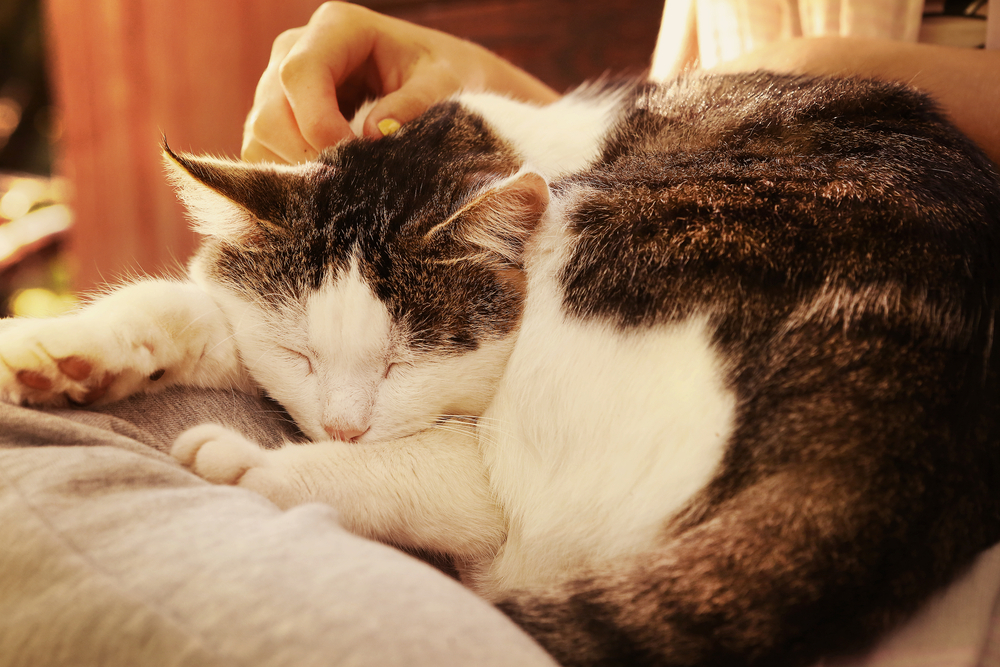
Addison’s Disease in Dogs: Causes, Symptoms, and Treatment
June 23, 2023
When to Put a Cat with FIV to Sleep?
July 18, 2023
Signs That Your Cat’s Arthritis Is Getting Worse
Cats are masters of disguise, and they can hide their pain and discomfort very well. However, as pet owners, we can spot subtle changes in their behaviour and movement that indicate their arthritis is getting worse. Here are some signs to look out for:
-
Reduced Activity
Cats with arthritis will become less active, preferring to sleep or rest instead of play or explore. You may notice that your cat no longer greets you at the door or follows you around the house, or perhaps is less likely to head out on a night-time patrol.
-
Changes in Appetite or Bathroom Habits
Cats with arthritis may experience a loss of appetite or changes in their bathroom habits. They may struggle to reach their food or litter box, causing them to avoid these activities altogether.
-
Altered mood
Cats with chronic pain – like arthritis – are often less playful, more “tired”, and often seem “grumpy”. But that’s not just old age – it’s pain.
-
Stiffness
Cats with arthritis will experience pain and stiffness in their joints, making it harder for them to move around. You may notice that your cat limps or struggles to jump onto furniture or climb stairs. You’re also likely to see that they’re less willing to jump up, or climb stairs – so their favourite “up high” hideaways may no longer seem to be their favourite, because they cannot get to them comfortably.
-
Limping
Despite the pain, it’s rare for a cat with arthritis to limp visibly – cats are usually masters at concealing their pain from us. So if your cat is walking with a limp, then it suggests the disease is far advanced.
How to Help an Old Cat With Arthritis
There are various measures you can take to assist your cat in coping with arthritis and enhancing their standard of living once they have been diagnosed with the condition.
-
Provide a Comfortable Environment
Ensure that your feline friend has a secure and cozy space to roam about in. Place soft bedding in their favourite spots, and make sure their litter box, food, and water are easily accessible. Low sided litter trays are an easy win for the stiff, arthritic cat; along with warm, draught-free sleeping areas and beds.
-
Help Your Cat Move Around
You can help your cat move around by providing them with ramps or steps to help them climb onto furniture. Avoid forcing them to move or jump, as this can cause further pain and discomfort.
-
Medication
While there is much we can do to reduce the impact of arthritis, medication is almost always needed to control the pain. There are several medications available to help manage your cat’s arthritis, including painkillers and anti-inflammatory drugs. Talk to your vet about which medication is best for your cat’s condition.
How Long Can a Cat Live With Arthritis?
Several factors, such as age, overall health, and the severity of arthritis determine the lifespan of cats. However, with appropriate care and treatment, our feline friends can live for multiple years despite their condition. The earlier they are diagnosed and begin treatment, the better for their quality and quantity of life!
However, as their health deteriorates, the quality of life for cats may diminish and euthanasia could be considered a more humane choice. It is crucial to work with your vet to keep track of your cat’s well-being, especially when they have a life-long condition like arthritis.
When Is It Time to Put Down a Cat With Arthritis?
Deciding to euthanise a cat with arthritis is never an easy choice, but sometimes it’s necessary to prevent further suffering. When making this tough decision, there are several factors to consider.
First and foremost, your cat’s quality of life should be the top priority. If they’re in constant pain and discomfort due to their arthritis, it may be time for euthanasia. But don’t just think about the bad – think about what they enjoy doing. Are they still able to enjoy life? Do the good days outnumber the bad? If not, it might be time to think about whether the time has come.
Additionally, if medication or other treatment options aren’t helping alleviate their symptoms and their condition is only worsening, euthanasia may need to be considered.
Your cat’s age and overall health should also factor into the decision-making process. If they’re elderly with other health issues that make managing their arthritis too difficult for them, then euthanasia could be the kindest option.
It’s important not to overlook your own feelings when deciding whether or not to put down your beloved pet. If you’re struggling emotionally or physically caring for them has become too much of a burden, then it might be time for euthanasia as well.
Remember that ultimately this is a personal decision based on what will provide your cat with the best possible quality of life. There isn’t one right answer; instead, choose what feels right for both you and your furry friend. Our helpful Quality of Life Questionnaire might be able to help you understand your cat’s quality of life.
Conclusion
Arthritis in cats can be a painful and debilitating condition, and as pet owners, we want to do everything we can to help our furry friends. While we can manage their symptoms with medication and lifestyle changes, there may come a point where we have to consider gentle at-home cat euthanasia to prevent further suffering.
FAQs
Is arthritis in cats a common condition?
Arthritis in cats is a relatively common condition, especially in older cats, with as many as 90% of senior cats showing some signs of the condition.
Can cats with arthritis still lead active lives?
Yes – with proper treatment and care, cats with arthritis can still lead active and happy lives, although they may need some assistance and accommodation.
How can I help my cat manage their arthritis?
You can help your cat manage their arthritis by providing a comfortable environment, helping them move around, and giving them medication as prescribed by your veterinarian.
Is euthanasia the only option for cats with arthritis?
No, definitely not, there are a wide range of treatment options. That said, it may become necessary later in the course of the disease to prevent further suffering.
How can I know when it is time to consider euthanasia for my cat with arthritis?
When considering euthanasia for your cat with arthritis, it is important to consider their quality of life (both good and bad days), treatment options, age and health, and your own feelings and emotions. Working closely with your veterinarian can help you make an informed decision.
Sources:
American Veterinary Medical Association (AVMA): https://www.avma.org/resources-tools/pet-owners/petcare/arthritis-cats
International Cat Care: https://icatcare.org/advice/cat-health/arthritis-in-cats/
Cornell University College of Veterinary Medicine: https://www.vet.cornell.edu/departments-centers-and-institutes/cornell-feline-health-center/health-information/feline-health-topics/arthritis



